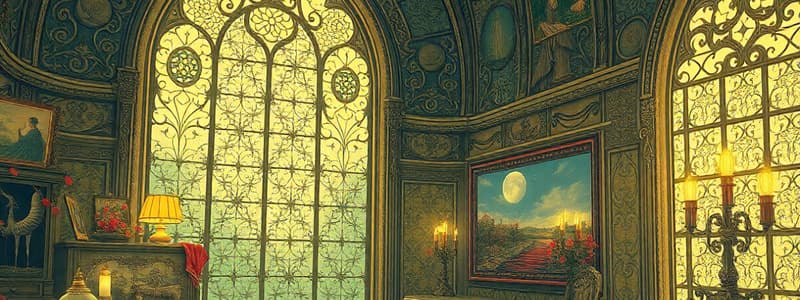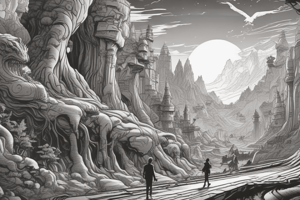Podcast
Questions and Answers
What is one of the primary purposes of film scoring?
What is one of the primary purposes of film scoring?
- To create a predictable soundtrack for the audience.
- To provide a detailed explanation of the plot.
- To enhance the emotional impact of scenes. (correct)
- To equalize sound levels throughout the film.
Which type of film score combines orchestral and electronic elements?
Which type of film score combines orchestral and electronic elements?
- Acoustic
- Traditional
- Hybrid (correct)
- Electronic
How can music genres impact a film?
How can music genres impact a film?
- They can affect marketing and audience expectations. (correct)
- They solely determine the film's budget.
- They ensure a coherent storyline without visual elements.
- They restrict the film's thematic content.
What is a common characteristic of jazz music in film?
What is a common characteristic of jazz music in film?
Which of the following composers is known for creating scores for both 'Inception' and 'The Lion King'?
Which of the following composers is known for creating scores for both 'Inception' and 'The Lion King'?
Flashcards are hidden until you start studying
Study Notes
Film Scoring
- Definition: The process of composing music specifically for a film.
- Purpose:
- To enhance the emotional impact of scenes.
- To provide continuity and coherence to the storyline.
- To establish character identities and themes.
- Types of Film Scores:
- Orchestral: Traditional arrangement with symphonic instruments.
- Electronic: Uses synthesized sounds and technology for score creation.
- Hybrid: Combines orchestral and electronic elements.
- Key Components:
- Themes: Melodic motifs associated with characters or ideas.
- Underscore: Background music that supports the narrative without overwhelming it.
- Sound Design: Incorporates effects and ambient sounds to create atmosphere.
- Notable Film Composers:
- John Williams (Star Wars, Jaws)
- Hans Zimmer (Inception, The Lion King)
- Ennio Morricone (The Good, the Bad and the Ugly)
Music Genres in Film
- Function of Music Genres:
- Sets the tone and mood of the film.
- Influences audience perceptions and emotions.
- Common Genres:
- Classical: Often used in period pieces; evokes sophistication.
- Jazz: Sets a relaxed, urban mood; common in films set in the 1920s-1950s.
- Rock: Captures youth culture; typically used in action and adventure films.
- Pop: Engages contemporary audiences; often featured in musicals and romantic comedies.
- Electronic/Dance: Popular in sci-fi and thrillers; creates a modern, energetic feel.
- Impact of Genre:
- Affects marketing and audience expectations.
- Can enhance or undermine narrative elements based on cultural associations.
- Genre-Blending: Many films use a mix of genres to create unique soundscapes, such as combining classical with rock or jazz.
Film Scoring
- Composing music specifically for films to amplify emotional resonance.
- Enhances scenes, provides continuity, and establishes character themes.
- Types of Film Scores:
- Orchestral: Features traditional symphonic instruments for a classic sound.
- Electronic: Utilizes synthesized sounds and modern technology for composition.
- Hybrid: A blend of orchestral and electronic elements for diverse soundscapes.
- Key Components:
- Themes: Melodic ideas linked to specific characters or concepts.
- Underscore: Subtle background music supporting the narrative.
- Sound Design: Combines effects and ambient sounds, enriching the film's atmosphere.
- Notable Film Composers:
- John Williams, known for iconic scores in Star Wars and Jaws.
- Hans Zimmer, acclaimed for works in Inception and The Lion King.
- Ennio Morricone, famous for The Good, the Bad and the Ugly.
Music Genres in Film
- Music genres play a crucial role in setting film tone and mood, heavily influencing the audience's emotional responses.
- Common Genres:
- Classical: Evokes elegance and sophistication, often in historical narratives.
- Jazz: Creates a relaxed urban feel, prevalent in films set in the 1920s-1950s.
- Rock: Captures youthful culture, frequently utilized in action-adventure films.
- Pop: Appeals to modern audiences, typical in musicals and romantic comedies.
- Electronic/Dance: Common in sci-fi and thrillers, generating an energetic, contemporary atmosphere.
- Impact of Genre:
- Shapes marketing strategies and meets audience expectations.
- Can either enhance or detract from narrative elements based on cultural context.
- Genre-Blending: Films often combine various genres, creating distinctive soundscapes, such as merging classical with rock or jazz.
Studying That Suits You
Use AI to generate personalized quizzes and flashcards to suit your learning preferences.




